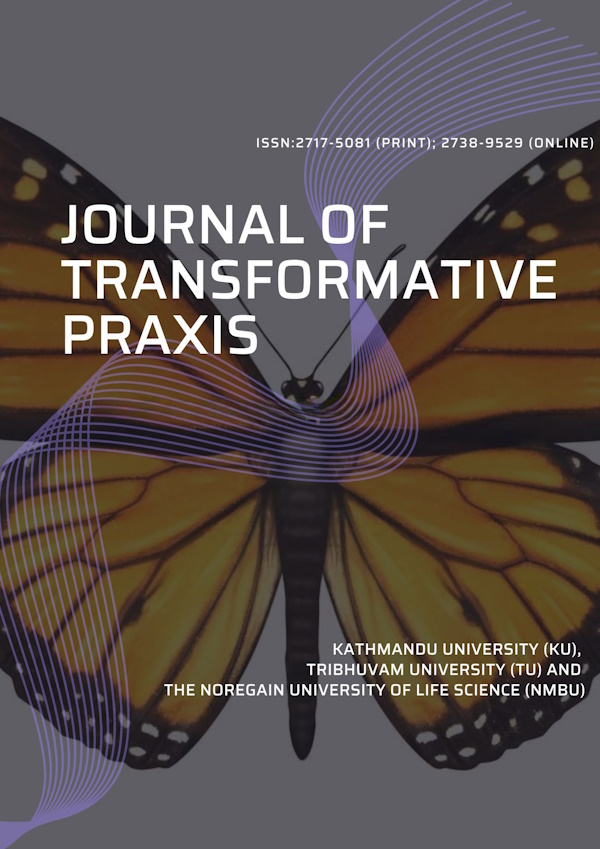
How does Epistemic Injustice Manifest for a Hard of Hearing Female Student? An Autoethnographic Reflection
Original Article
Journal of Transformative Praxis, Volume 6, Issue 1, June 2025, -
Publication date: Jun 28, 2025
Views: 234 | Downloads: 0
How to cite this article
APA
In-text citation: (Thakuri, 2025)
Reference: Thakuri, N. (2025). How does Epistemic Injustice Manifest for a Hard of Hearing Female Student? An Autoethnographic Reflection. Journal of Transformative Praxis, 6(1), -.
Reference: Thakuri, N. (2025). How does Epistemic Injustice Manifest for a Hard of Hearing Female Student? An Autoethnographic Reflection. Journal of Transformative Praxis, 6(1), -.
Vancouver
In-text citation: (1), (2), (3), etc.
Reference: Thakuri N. How does Epistemic Injustice Manifest for a Hard of Hearing Female Student? An Autoethnographic Reflection. Journal of Transformative Praxis. 2025;6(1):.
Reference: Thakuri N. How does Epistemic Injustice Manifest for a Hard of Hearing Female Student? An Autoethnographic Reflection. Journal of Transformative Praxis. 2025;6(1):.
AMA
In-text citation: (1), (2), (3), etc.
Reference: Thakuri N. How does Epistemic Injustice Manifest for a Hard of Hearing Female Student? An Autoethnographic Reflection. Journal of Transformative Praxis. 2025;6(1), -.
Reference: Thakuri N. How does Epistemic Injustice Manifest for a Hard of Hearing Female Student? An Autoethnographic Reflection. Journal of Transformative Praxis. 2025;6(1), -.
Chicago
In-text citation: (Thakuri, 2025)
Reference: Thakuri, Narayani. "How does Epistemic Injustice Manifest for a Hard of Hearing Female Student? An Autoethnographic Reflection". Journal of Transformative Praxis 2025 6 no. 1 (2025): -.
Reference: Thakuri, Narayani. "How does Epistemic Injustice Manifest for a Hard of Hearing Female Student? An Autoethnographic Reflection". Journal of Transformative Praxis 2025 6 no. 1 (2025): -.
Harvard
In-text citation: (Thakuri, 2025)
Reference: Thakuri, N. (2025). How does Epistemic Injustice Manifest for a Hard of Hearing Female Student? An Autoethnographic Reflection. Journal of Transformative Praxis, 6(1), pp. -.
Reference: Thakuri, N. (2025). How does Epistemic Injustice Manifest for a Hard of Hearing Female Student? An Autoethnographic Reflection. Journal of Transformative Praxis, 6(1), pp. -.
MLA
In-text citation: (Thakuri, 2025)
Reference: Thakuri, Narayani "How does Epistemic Injustice Manifest for a Hard of Hearing Female Student? An Autoethnographic Reflection". Journal of Transformative Praxis, vol. 6, no. 1, 2025, pp. -.
Reference: Thakuri, Narayani "How does Epistemic Injustice Manifest for a Hard of Hearing Female Student? An Autoethnographic Reflection". Journal of Transformative Praxis, vol. 6, no. 1, 2025, pp. -.
ABSTRACT
This evocative autoethnographic study explores the systemic inequities and epistemic injustices experienced by hard-of-hearing individuals, as reflected through the author’s personal experiences as a female student. Framed within the broader discourse of social justice, the research critiques dominant narratives of inclusion that often obscure or marginalize the specific needs of the hard-of-hearing community. Anchored by a central research question addressing the manifestations of epistemic injustice within inclusive justice systems, the study employs autoethnography to trace the author’s fragmented educational journey. Through personal narrative and critical reflection, the research identifies significant gaps in both scholarly understanding and institutional practices. The findings underscore the necessity of moving beyond generalized notions of inclusion toward a more equitable framework that recognizes and legitimizes the distinct voices and needs of hard-of-hearing individuals, thereby advancing genuine social justice.
REFERENCES
---
LICENSE
This work is licensed under a Creative Commons Attribution-ShareAlike 4.0 International License.
